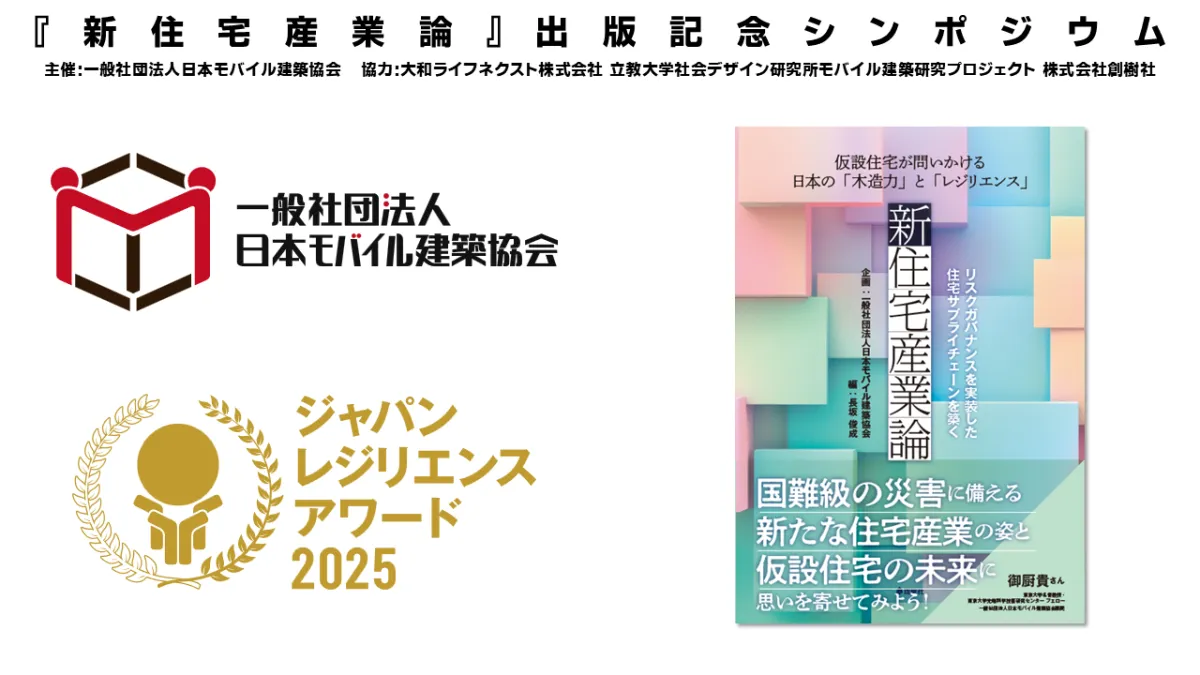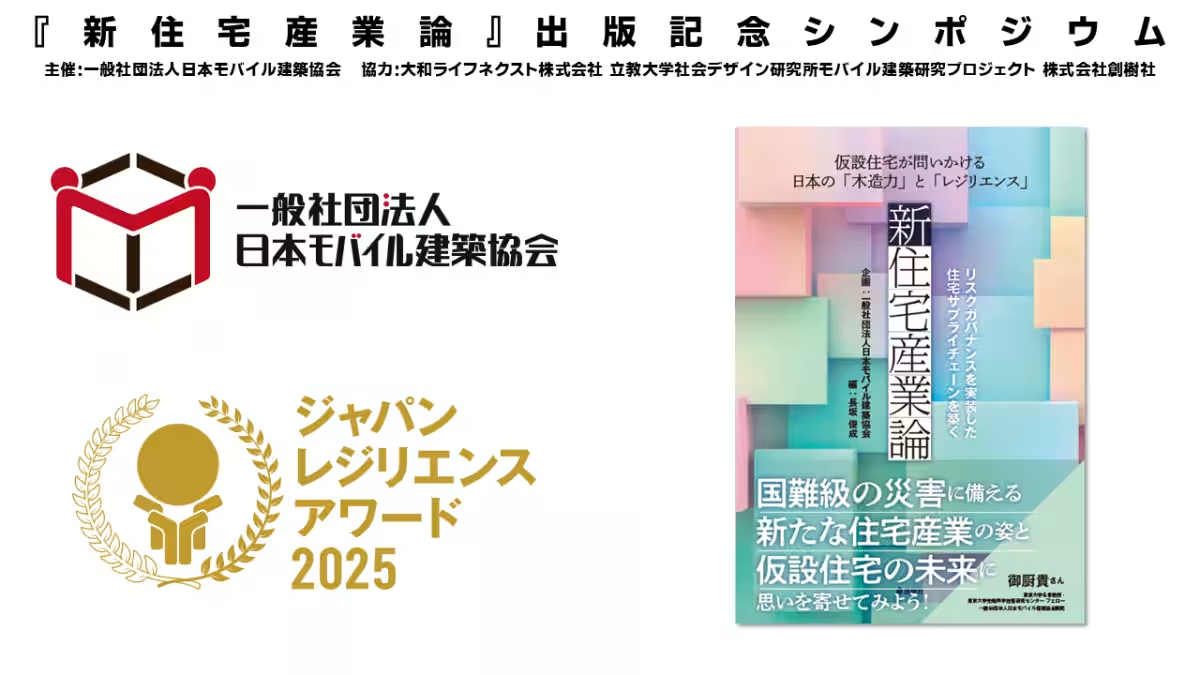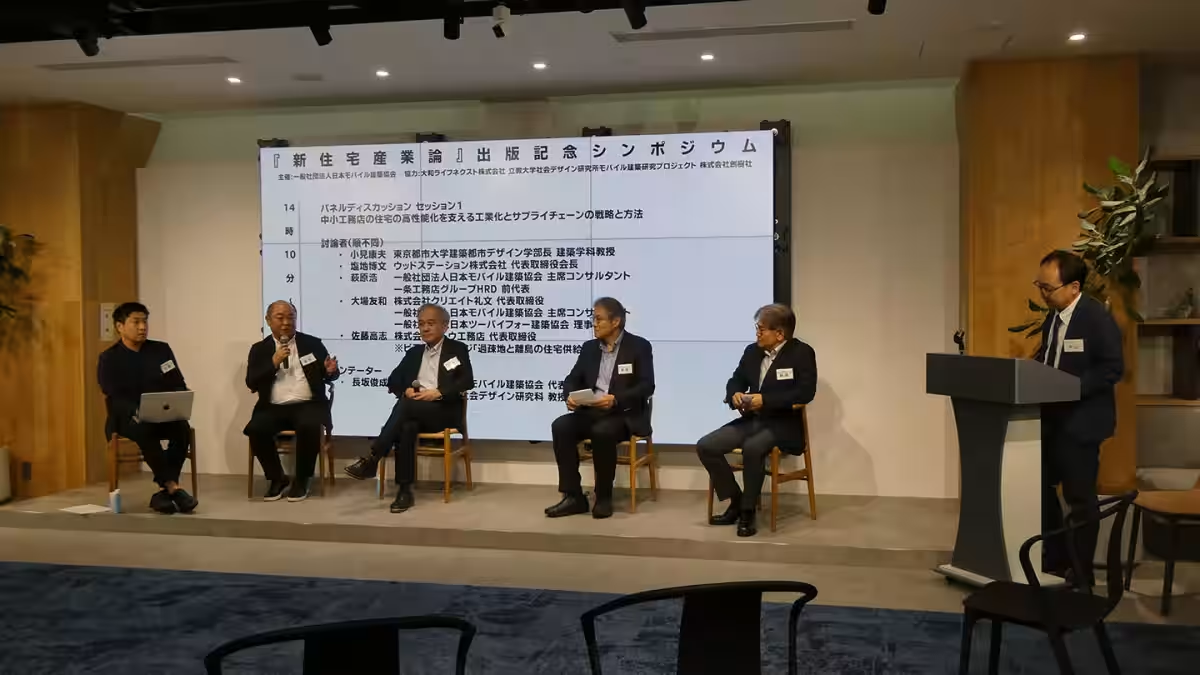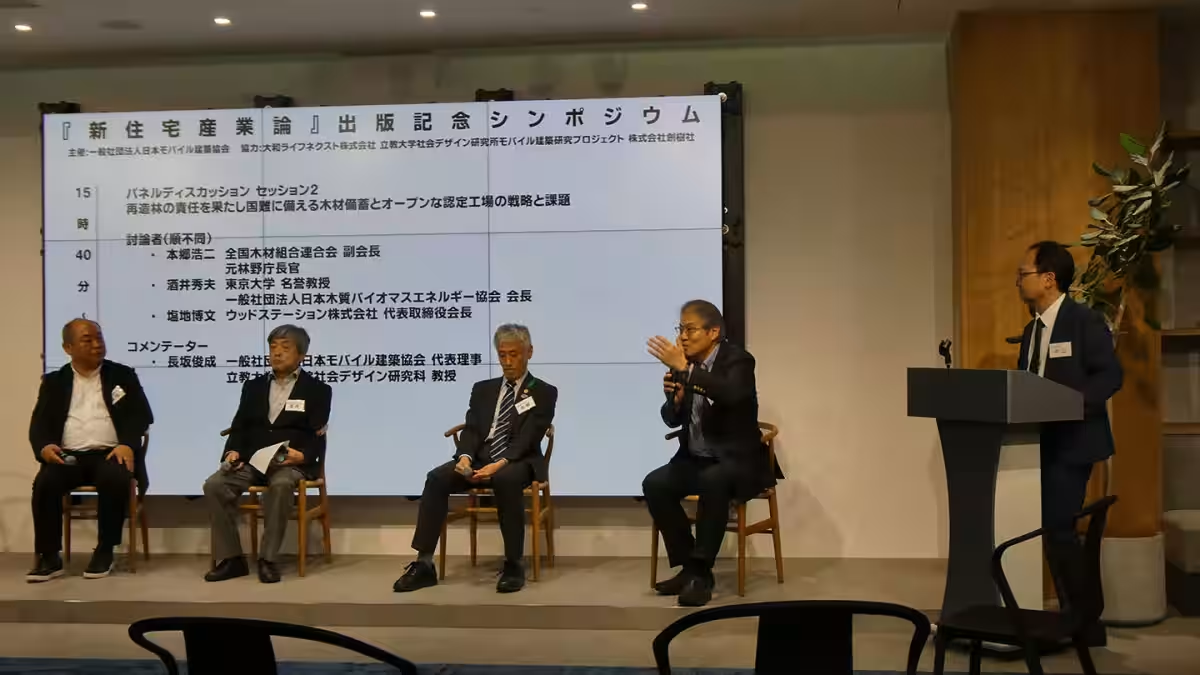

Reconstruction of Wooden Housing Industry: Symposium on New Residential Industry Theory
Symposium on the New Residential Industry Theory
On May 13, 2025, the Japan Mobile Architecture Association, headquartered in Chiyoda, Tokyo, hosted a symposium to celebrate the publication of "New Residential Industry Theory," released on April 8, 2025. This event brought together practitioners and researchers from various fields, including architecture, forestry, government, and academia, to engage in dynamic discussions aimed at restructuring the wooden housing industry starting from forest resources.
Purpose and Background of the Symposium
The book "New Residential Industry Theory" addresses several critical issues concerning the housing sector today:
1. Ensuring Housing Supply Readiness for Major Disasters: The need to improve housing supply capabilities in preparation for potential large-scale disasters such as the Nankai Trough Earthquake.
2. Realizing Reforestation through Timber Utilization: Promoting sustainable forest management and reforestation initiatives.
3. Creating an Open Industrialization System for Small and Medium-sized Builders: Developing frameworks that allow smaller construction firms to participate in industrialization efforts.
4. Establishing a Certified Factory Network Across Japan: A vision for a network of certified factories dispersed across 1,000 locations nationwide.
5. Proposing a New Supply Model Connecting Temporary and Permanent Housing: Testing innovative models that link disaster temporary housing with permanent housing solutions.
The symposium served as a kickoff event to discuss how to balance the bulk supply of temporary housing with timber stockpiling and sustainable use in light of future disasters. Key learnings from recent initiatives, including the provision of 261 mobile emergency temporary houses during the Noto Peninsula Earthquake and 300 temporary lodgings for supporters, informed the discussions.
Session 1: Enhancing the Performance of Housing for Small Builders
- - Theme: Strategies and Methods for Industrialization and Supply Chain Support
- - Speakers:
- Hirobumi Shioji: Chairman, Wood Station Co., Ltd.
- Hiroshi Hagiwara: Chief Consultant, Japan Mobile Architecture Association.
- Tomokazu Oba: CEO, Create Reibun Inc.
- Takashi Sato: CEO, Sato Construction Co., Ltd. (participated via video).
- - Comments by: Tosho Nagasaka, Executive Director of the Japan Mobile Architecture Association.
- - Facilitator: Norifumi Nakayama, CEO of Sohjusha.
Key Discussion Points:
- - The strengths of small builders in responding to local needs were highlighted, demonstrating their flexibility in addressing specific client requirements. However, it was noted that structural support is essential for achieving speed and high performance.
- - The benefits of standardizing specifications and housing types to streamline efficiency were discussed, suggesting that this could alleviate burdens on smaller builders while ensuring consistent quality.
- - Proposals for a small-scale decentralized certified factory network were outlined, envisioning mobile production units and parking lot-sized factories to integrate manufacturing and construction on a regional basis.
- - The need for developing a supportive framework for training young professionals in design and technology was emphasized to address the shortage of skilled workers in small firms.
- - A new business model focusing on horizontal collaboration between construction firms and certified factories was endorsed, promoting an integrated supply chain approach.
Session 2: Timber Stockpiling and Open Certified Factories
- - Theme: Fulfilling Reforestation Responsibilities and Strategies for Disaster Preparedness
- - Speakers:
- Hideo Sakai: Emeritus Professor, University of Tokyo and Chairman, Japan Wood Biomass Energy Association.
- Hirobumi Shioji: Chairman, Wood Station Co., Ltd.
- - Comments by: Tosho Nagasaka, Executive Director of the Japan Mobile Architecture Association.
- - Facilitator: Norifumi Nakayama, CEO of Sohjusha.
Key Discussion Points:
- - The need to redefine the role of the housing industry as more than just a participant in timber harvesting—is crucial, recognizing its responsibility as a player in reforestation.
- - A call for national support for timber stockpiling was made to prepare for sudden surges in demand during disasters.
- - Expanding the roles of smaller timber processing establishments was deemed necessary to ensure a diverse and robust support network.
- - The discussions emphasized the diversification of timber applications beyond construction materials, including energy and interior design.
- - The significance of aligning wooden housing initiatives with national policies on decarbonization, disaster prevention, and regional revitalization was reinforced.
Conclusion and Future Directions
Nagasaka concluded the symposium with a message highlighting the necessity for collaboration among institutions, field practitioners, and academia to foster a co-creative model in the housing sector.
The Japan Mobile Architecture Association plans to advance towards an implementation phase focusing on strengthening ties with construction firms and timber mills, designing the certified factory network, and standardizing disaster supply models through mobile architecture. As parting notes, the conference urged the establishment of a decentralized supply chain that can cater to high-performance, high-value wooden housing with open and scalable production processes.
Book Information
For those interested in obtaining the book "New Residential Industry Theory," orders can be made via the following links. For orders of ten copies or more, please complete the form provided, while orders of fewer than ten copies can be made through the online shop.



Topics Other)










【About Using Articles】
You can freely use the title and article content by linking to the page where the article is posted.
※ Images cannot be used.
【About Links】
Links are free to use.